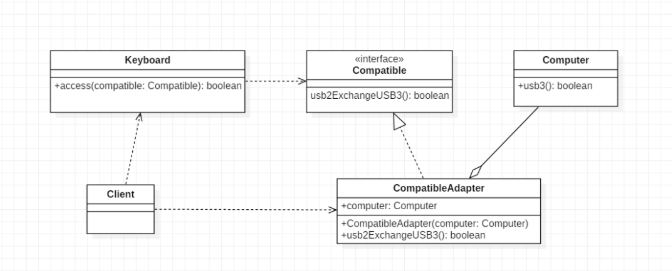## **1. 基本介绍**
>1.适配器模式(Adapter Pattern)将某个类的接口转换成客户端期望的另一个接口表示,主要的目的是兼容性,让原本因接口不匹配不能一起工作的两个类可以协同工作。其别名为包装器(Wrapper);
2.适配器模式属于结构型模式;
3.主要分为三类:类适配器模式,对象适配器模式,接口适配器模式。
## **2. 工作原理**
>1.适配器模式:将一个类的接口转换成另一种接口,让原本接口不兼容的类可以兼容;
2.从用户的角度看不到被适配者,是解耦合的;
3.用户调用适配器转化出来的目标接口方法,适配器再调用被适配者的相关接口方法
4.用户收到反馈结果,感觉只是和目标接口交互。

## **3. 类适配器**
#### 基本介绍
>Adapter类,通过继承src类,实现dst类接口,完成src->dst的适配
#### 原理图
>电脑3.0接口兼容键盘2.0接口

代码实现
`电脑类:`
```
/**
* 电脑
*/
public class Computer {
/**
* 电脑串口为3.0
* @return
*/
public boolean usb3(){
System.out.println("电脑的USB接口为3.0");
System.out.println("该电脑串口正常运行");
return true;
}
}
```
`转换接口:`
```
/**
* 兼容interface
*/
public interface Compatible {
boolean usb2ExchangeUSB3();
}
```
`适配器类:`
```
/**
* 适配器类
*/
public class CompatibleAdapter extends Computer implements Compatible {
/**
* 3.0接口兼容2.0接口
*/
@Override
public boolean usb2ExchangeUSB3() {
//获取电脑的3.0接口
boolean value = super.usb3();
if (value){
//TODO 接口3.0兼容2.0接口
System.out.println("接口3.0兼容2.0接口");
return true;
}
return false;
}
}
```
`键盘接入类:`
```
/**
* 键盘接入
*/
public class Keyboard {
/**
* 键盘USB为2.0
* @return
*/
public boolean access(Compatible compatible){
if (compatible.usb2ExchangeUSB3()){
System.out.println("电脑,键盘正常运行");
return true;
}
return false;
}
}
```
`测试类:`
```
public class Client {
public static void main(String[] args) {
System.out.println("类适配器模式");
Keyboard keyboard = new Keyboard();
boolean value = keyboard.access(new CompatibleAdapter());
if (value){
System.out.println("正常3.0兼容2.0");
}else{
System.out.println("不兼容");
}
}
}
```
`执行结果:`
```
对象适配器模式
电脑的USB接口为3.0
该电脑串口正常运行
接口3.0兼容2.0接口
电脑,键盘正常运行
正常3.0兼容2.0
```
`注意事项`
>1.Java是单继承机制,所以类适配器需要继承src类,这一点算是一个缺点,因为这要求dst必须是接口,有一定的局限性;
2.src类的方法在Adapter中都会暴露出来,也增加了使用的成本;
3.由于其继承了src类,所以它可以根据需求重写src类的方法,使得Adapter的灵活性增强了。
## **4. 对象适配器**
#### 基本介绍
>1.基本思路和类的适配器模式相同,只是将Adapter类作修改,不是继承src类,而是持有src类的实例,以解决兼容性的问题。即:持有src类,实现dst类接口,完成src->dst的适配;
2.根据"合成复用原则",在系统中尽量使用关联关系来替代继承关系,因此大部分结构型模式都是对象结构型模式;
3.对象适配器模式是适配器模式常用的一种。
#### 原理图
>电脑3.0接口兼容键盘2.0接口

代码实现
`电脑类:`
```
/**
* 电脑
*/
public class Computer {
/**
* 电脑串口为3.0
* @return
*/
public boolean usb3(){
System.out.println("电脑的USB接口为3.0");
System.out.println("该电脑串口正常运行");
return true;
}
}
```
`转换接口:`
```
/**
* 兼容interface
*/
public interface Compatible {
boolean usb2ExchangeUSB3();
}
```
`适配器类:`
```
/**
* 适配器类
*/
public class CompatibleAdapter implements Compatible{
//使用聚合关系,符合合成复用原则
private Computer computer;
//构造方法
public CompatibleAdapter(Computer computer){
this.computer = computer;
}
/**
* 3.0接口兼容2.0接口
*/
@Override
public boolean usb2ExchangeUSB3() {
//获取电脑的3.0接口
boolean value = computer.usb3();
if (value){
//TODO 接口3.0兼容2.0接口
System.out.println("接口3.0兼容2.0接口");
return true;
}
return false;
}
}
```
`键盘类:`
```
/**
* 键盘接入
*/
public class Keyboard {
/**
* 键盘USB为2.0
* @return
*/
public boolean access(Compatible compatible){
if (compatible.usb2ExchangeUSB3()){
System.out.println("电脑,键盘正常运行");
return true;
}
return false;
}
}
```
`测试类:`
```
/**
* 测试类
*/
public class Client {
public static void main(String[] args) {
System.out.println("对象适配器模式");
Keyboard keyboard = new Keyboard();
boolean value = keyboard.access(new CompatibleAdapter(new Computer()));
if (value){
System.out.println("正常3.0兼容2.0");
}else{
System.out.println("不兼容");
}
}
}
```
`执行结果:`
```
对象适配器模式
电脑的USB接口为3.0
该电脑串口正常运行
接口3.0兼容2.0接口
电脑,键盘正常运行
正常3.0兼容2.0
```
#### 注意事项
>1.对象适配器和类适配器其实算是同一种思想,只不过实现方式不同。根据合成复用原则,使用聚合替代继承,所以它解决了类适配器必须继承src的局限性问题,也不再要求dst必须是接口。
2.使用成本更低,更灵活。
## **5. 接口适配器**
#### 基本介绍
>1.当不需要 全部实现接口提供的方法时,设计一个抽象类实现接口,并为该接口中每个方法提供一个默认实现(空方法),那么该抽象类的子类可有选择地覆盖父类的某些方法来实现需求。
2.适用于一个接口不想使用其所有的方法的情况。
#### 原理图

代码实现
`电脑接口类:`
```
/**
* 电脑接口
*/
public interface ComputerInterface {
//电源接口
void powerInterface();
//USB接口
void usbInterface();
//串行接口
void serialInterface();
//音频接口
void audioInterface();
}
```
`电脑抽象类适配器类:`
```
/**
* 电脑抽象类适配器
*/
public abstract class ComputerAdapter implements ComputerInterface{
//需要重写接口的全部方法,空实现(默认实现)
@Override
public void powerInterface() {
}
@Override
public void usbInterface() {
}
@Override
public void serialInterface() {
}
@Override
public void audioInterface() {
}
}
```
`测试类:`
```
/**
* 测试类
*/
public class Client {
public static void main(String[] args) {
//匿名内部类 ComputerAdapter为抽象类
ComputerAdapter computerAdapter = new ComputerAdapter(){
//如果业务仅需要覆盖powerInterface方法,不需要重写其他方法
@Override
public void powerInterface() {
System.out.println("使用接口适配器模式,仅调用powerInterface方法");
}
};
computerAdapter.powerInterface();
}
}
```
`执行结果:`
```
使用接口适配器模式,仅调用powerInterface方法
```
- 前言
- 第一章 设计七大原则
- 第1节 开闭原则
- 第2节 依赖倒置原则
- 第3节 单一职责原则
- 第4节 接口隔离原则
- 第5节 迪米特法则
- 第6节 里氏替换原则
- 第7节 合成复用原则
- 第二章 简单工厂模式
- 第1节 使用场景
- 第2节 示例代码
- 第三章 创建者模式
- 第1节 工厂方法模式
- 第2节 抽象工厂模式
- 第3节 建造者模式
- 第4节 原型模式
- 第5节 单例模式
- 第四章 结构型模式
- 第1节 适配器模式
- 第2节 桥接模式
- 第3节 组合模式
- 第4节 装饰者模式
- 第5节 外观模式
- 第6节 享元模式
- 第7节 代理模式
- 第五章 行为模式
- 第1节 责任链模式
- 第2节 命令模式
- 第3节 迭代器模式
- 第4节 中介者模式
- 第5节 备忘录模式
- 第6节 观察者模式
- 第7节 状态模式
- 第8节 策略模式
- 第9节 模板方法模式
- 第10节 访问者模式
- 第11节 解释器模式
